All she wanted was a photo of the new-born babies and asked that István and Tamás love the twins
When we began this story, I was still having treatment to get pregnant by artificial insemination. It can be a deeply depressing process to go through: you think, what happens if this doesn’t succeed? Would I be capable of, say, adopting? Would I be able to love a child who might have had a terribly tough background, arriving with a “package” that I would have to deal with. The straight answer, I think, is that even now I couldn’t do it, even after seeing close-up what a chance the twins received when they were adopted by István and Tamás.
I began documenting the life of the family with my colleague Orsi Ajpek because we thought it was important that people become better informed about rainbow families like this one. As a family, they may be unusual, but they live the same kind of ordinary, everyday life that any heterosexual family lives. It’s just that in Hungary the circumstances have radically changed in the past few months. There have been a series of legal changes that have made adoption by single parents and same-sex couples all but impossible, followed by the “paedophile law” that explicitly incited hatred towards gay people.
About a year ago we talked to István and Tamás about how absurd it was that the 40-hour course to prepare would-be adoptive parents was no longer mandatory. Now we are talking about whether the time might come where the family packs its bags and finds another more welcoming country in which to bring up their children.
In Hungary, it is unusual for a rainbow family to put their lives in the public eye. István and Tamás don’t want to become a visible target and are protective of their privacy. They have their own everyday struggles as adoptive parents. Nevertheless, they decided to show themselves so that those who attack gays and rainbow families out of ignorance can see how they live. Perhaps through this article people can understand that “these children are not suffering in chains and their parents don’t spend the whole year frolicking around in pink thongs in preparation for Pride, but in fact live ordinary lives”. Another factor was a wish to help young people who think that their lives are at an end because they are not heterosexual. They want to set an example for them and give those people hope. If reading their story changes the opinion of just one parent and encourages them to support their homosexual child, then the publicity has been worth it, the two fathers say.

We arrive in the residential district of a small town in Pest County and for the umpteenth time park in front of their house. The twins are tottering in the doorway waiting for us, but there has been some drama and it is hard to say which of them has bigger tears rolling down their face.
“It has been one of those days,” says István with an air of resignation. The magic of our arrival quickly loses its effect and the two children continue crying in unison while demanding to be picked up and allowed on to their dads’ knees. But lunch needs to be prepared. It’s mushroom and paprika stew and between stirring István gives hugs to first one and then the other, and sometimes to both at once, to calm them down. He doesn’t despair — it’s the most natural thing in the world for him to be the father of two children. For as long as he can remember he has wanted this with Tamás.

For seven years, starting in 2012, they actively tried to become parents. They had been living in the Scottish city of Glasgow for two years. They got married in 2016 and wanted to settle down there, but in the end they came back to Hungary. One reason was that they hadn’t been able to adopt there. They wanted to have children so badly, and initially even contemplated going down the illegal route. No time or money was spared in exploring every possibility, including methods that we outsiders can only guess at.
They described the surreal world constructed around those who will give anything to become a parent. A huge amount of money changes hands and there is a real battle for potential surrogate mothers. They were in discussions with Portuguese, Ukrainian, British and Hungarian surrogate mothers but had also considered the Czech Republic, Congo and South Africa. The Ukrainian surrogate mother would, for a larger amount of money, have used her own eggs to have their children. One Hungarian woman offered to do it for 5 million forints (€14,000) but they didn’t go through with it. They say that at first it seemed like the easier option to pay to become a parent, but it isn’t. “What do you say to the child about how much you paid for them? The price of a small flat?” They felt that that none of these ways would work.

They finally decided that the official adoption route was the only acceptable way to go, which in Britain is a far longer and more complicated process than in Hungary. For six months they had to have monthly meetings with the social services. “We had to write essays, we had compulsory reading, we were interviewed separately and together, they asked for references from friends and employers” — they list the hoops they had to go through.
It was all going smoothly until Brexit completely jammed the process. In spite of the strict procedures they had followed they did not get approval for adoption. The problem wasn’t that they were two men, but that everything changed after Brexit.
“The biggest concern was that we would take the child away from its roots. It was very hard to explain to them that we hadn’t come from a Communist country.”
In the end their application was rejected because they were young and were studying alongside their work, so were not considered ready to be adoptive parents.
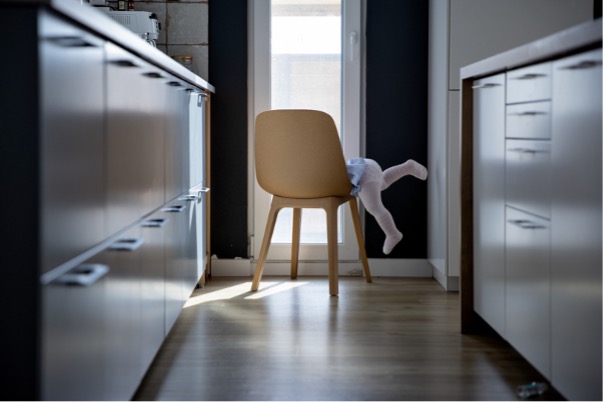
They had already decided to go back to Hungary if they didn’t get approval in Scotland. They moved back in 2017, but still had not given up hope of becoming parents. In Hungary it wasn’t possible even then to adopt as a same-sex couple, but a single person (ie, not married) living with a registered partner could adopt, regardless of their sexual orientation. They agreed that István should make the application. This was a conscious choice, as was the decision before they got married that they should take each other’s name, so that any children they did have would bear both their names.
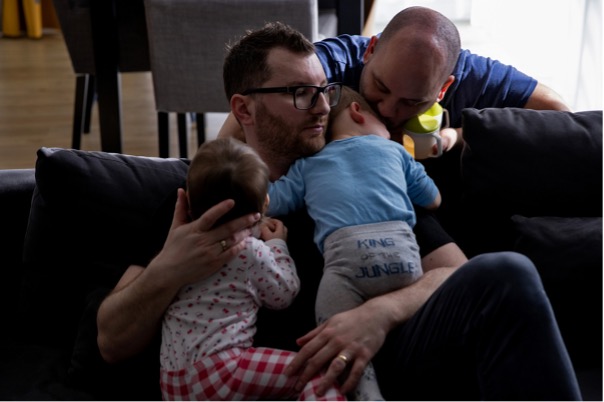
In early 2018 they applied to the Regional Child Protection Service (Tegyesz), which came to inspect their home and their circumstances. The couple went through the compulsory psychological assessments and completed the preparatory adoption course that was then mandatory.
The psychologist working with István said they generally recommended that a single would-be adoptive parent take on a child of the same sex, but István and Tamás asked for that not to be the case.
“We gave our reasons why we could also bring up a daughter. We said we understood the importance of a female model for a child’s all-round healthy upbringing, but we said this did not necessarily have to be the mother, and there would be grandparents, aunts and cousins around the child who would fill that role.”
Their arguments were accepted and at the end of 2018 they were given approval for adopting “a 0-4 year old child or twins” with no restrictions regarding their sex or background.
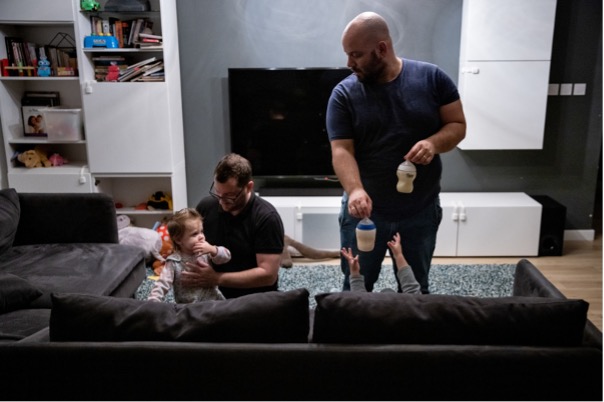
It was compulsory from 2003 onwards for would-be adopters to take part in a preparatory course. This 20-hour course was extended to 40 hours in 2018. This gave more time to cover important subjects such as connecting with children, the question of the child’s background, adopting older or disabled children and the handling of loss, according to Zsófia Kiss, a specialist psychologist. She runs courses for the Ágacska Foundation, which specialises in adoption. Alongside her birth daughter she has an adopted son, and often draws on her own experiences so that she can more convincingly prepare couples for adoption.
The aim of the course is to prepare the adopters so that as little as possible takes them by surprise. They cover the areas that are defined by genetics which adopters certainly cannot change. For example, genetically defined characteristics include the colour of their skin and eyes, their temperament, skills, capabilities and inherited diseases.
“However, the child’s behaviour and values are defined by its environment. There is no such thing as a stealing gene or a lying gene. Empathy can be taught,” Kiss says.
István and Tamás often came across these stereotypes when they intentionally prepared their friends and family members for the fact that there was a good chance that “Gypsy children would be running round the house”. This caused some serious debate when some acquaintances joked that they would have to hide their wallets away. But the couple also heard people say that if they adopted Roma children, “sooner or later their blood would show through”.
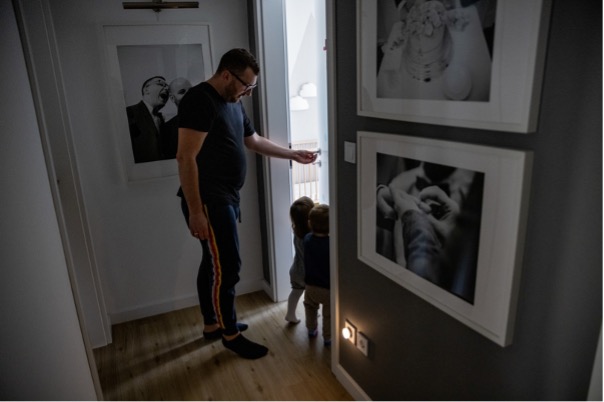
The majority of adopted children are born from unwanted pregnancies and have not received proper care in the womb. “The mother may have been starving or undernourished; she may have smoked, drunk or taken drugs — but it should be noted that generally it is not the mother’s fault that she finds herself in this position,” says Kiss. All such behaviour affects the embryo’s nervous system. An underdeveloped nervous system can be a factor in the neurological and psychiatric states such as ADHD, concentration problems and delayed speech development, which cannot be cured but can be handled. Adopters need to be prepared for this.
“We don’t want to shock them but we tell them everything that could arise, which of course doesn’t mean that it will,” the psychologist explains.
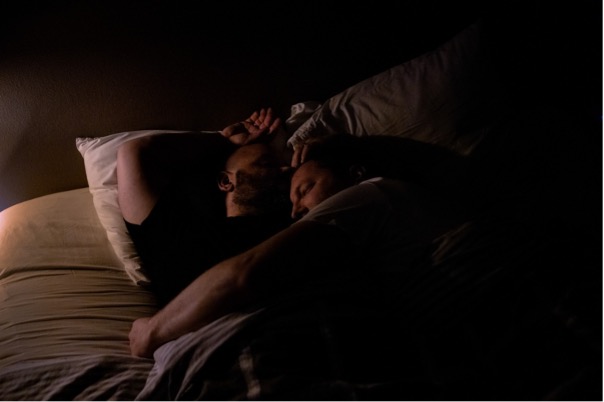
Adoption is often preceded by loss. Typically, adopters have not themselves been able to have biological children, and at this point the great majority resort to medical help. When that also proves unsuccessful the would-be adopter is already burdened with a considerable sense of loss. This loss has to be processed, Kiss says, because the adopted child has its own losses which also have to be handled.
“If I am not well myself, it will be harder to help others. If I am still feeling that it is a blow of fate that I couldn’t have biological children, and if I go into adoption with the sense that “If I can’t have a horse, I’ll make do with a donkey,” that is a huge trap. The child will grow up in the shadow of this idealised biological child that I am still clinging to,” Kiss says.
It is not only heterosexual couples that have to struggle with loss. István and Tamás had to abandon their hopes of having a biological child because of the legal system in Hungary. “If we had gone in for adoption in a different country, we might have been able to go through surrogacy. But even if we had got round Hungarian laws and had decided to live in a mosaic family, having children with a lesbian couple, we still did not want to be ‘weekend fathers’,” they say.
They also had to accept that their adopted children won’t bear any of their own features, but they say that they can see their gestures and habits in the children. “Our daughter sleeps in the same way as Tamás, and like him hates labels in her clothes,” they say.
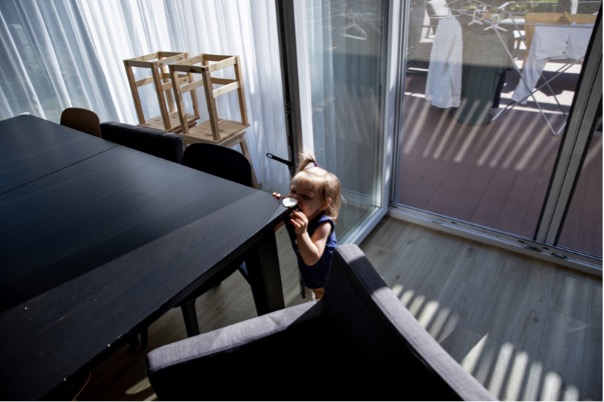
The government modified the legislation on adoption last year. In theory this aimed to simplify and speed up the process, so that more children could find families quicker. Children in the child protection system can be adopted after three months instead of six months if their birth parents take no interest in them. The 40-hour preparatory course that had been mandatory was made optional and free, a move that aroused strong protest.
“To be frank, we wouldn’t have gone on the course if it hadn’t been compulsory. We thought that we knew it all,” Tamás says. However, they acknowledge that they learnt skills on the course that helped them through the harder moments. For them the course was the most useful and most important part of the adoption process, “because a 3-year-old can’t hear that they have been rejected. One can involuntarily think or even actually say such things,” István says. “One of our very kind friends asked — in tears, with the best intentions: ‘How can people reject them?’ I explained that these children have not been rejected, they have been looked after. The child who has been rejected is the one found on a lakeside shore in a plastic bag.”
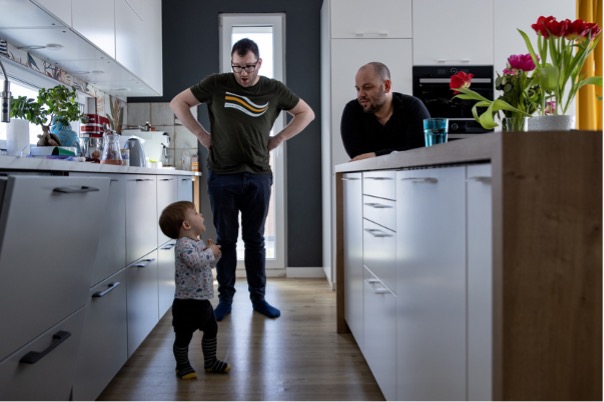
However, making the course optional is not the main problem, say the dads. Now basically only married couples have a chance of adoption — the decision over whether unmarried people (or same-sex couples) can adopt “in cases deserving of particular merit” lies in the hands of one single person, the minister of family affairs. In the modified legislation, children that are up for adoption must first be offered to married couples in the same county. If that doesn’t succeed, the search is widened to include married couples elsewhere in the country. If that is also unsuccessful, then the search is opened up to single people, first at a county level and finally at a national level. The children that are available for adoption at that final stage are those that were turned down by heterosexual couples. If the minister decides that a child should not be given to a single adopter, the case can spin out and the child can get stuck in the system. So effectively adoption has become harder for the very people who were typically the most likely to undertake the upbringing of older or more problematic children and those with a more troubled background.
‘Those who are most welcoming are the ones in this system who for the bloody life of them won’t be given children. And that is not fair. Why is a single parent worth less than a heterosexual married couple?” István and Tamás ask.
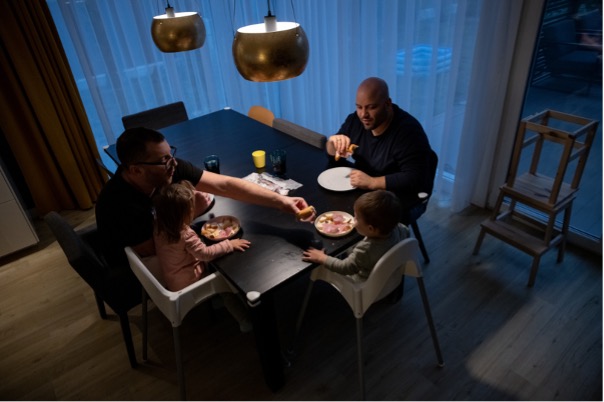
Once the couple received their approval, they didn’t even dare go on holiday, they were so anxiously awaiting the phone call. On the advice of friends they signed up with an adoption agency. Such agencies operate on certain conditions. In Hungary there are two agencies that deal with single parent adopters — in exchange for an annual membership and a commission.
In September 2019 the head of the agency finally rang them to say a woman had chosen their profile. After the second call it turned out that it was opposite-sex twins.
“They told us the woman was 32 weeks pregnant and was about to give birth. We were given their background, their little ‘package’, and told to decide,” István says about the second phone call. He says it was not an utterly difficult “package” but there were “some things in it”. No one other than the couple themselves knows exactly what it contained, and they have deliberately not told anyone, even their closest friends. “Our story begins with the phone ringing. What happened before that is the babies’ story, which we will tell them one day. It is up to them if they want to talk about it then,” Tamás says.
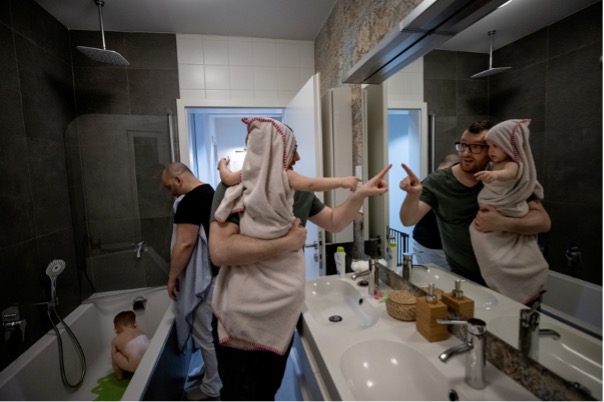
Since it was an open adoption process, István and Tamás met the twins’ biological mother. They say a meeting like that is both incredibly depressing and uplifting, and it was the agency boss who got them through the more awkward moments.
“Even after the children are born you are full of doubts. You are afraid the mother will have second thoughts, while she is afraid you won’t like her children and will change your mind.” They both describe her as an attractive and kind woman. They have a positive image of her, which they say will make it much easier to talk about her with the twins later.
“We don’t want to embellish the story but we can give a positive image of her. That is how we have to discuss the whole thing, because these children, like any adopted children when they reach a certain age — whatever you do — feel rejected. These children weren’t rejected, because their biological mother worked hard to make sure they would be all right. She took care of them.” By getting in touch with the agency, she gave them a chance. She asked that they should go to a house with a garden, to a family without other children, and she explicitly said she wanted a gay couple to adopt them. The agency also offered her heterosexual couples, but István and Tamás were the first that she met.
“We reassured her that if she chose us, we could promise her that we would give our lives for these babies and we would do everything we could to make sure they have a good life.”
István and Tamás particularly wanted her to choose the children’s names. When they had their first meeting, it turned out that she had already chosen names. It was one of the most touching moments when she said the two names, because suddenly it gave a personality to the two children. After that meeting, the mother did not want to meet any other couples.
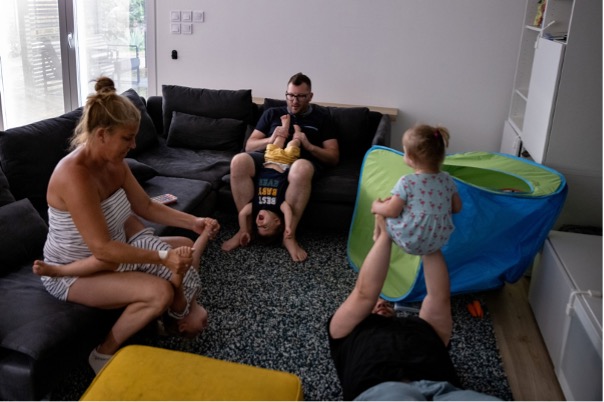
The twins were born in the 35th week, at the end of November 2019. “After we saw the babies, the head of the agency asked us again if we intended to go ahead with the adoption.” István and Tamás of course burst into tears and for the hundredth time said yes. The agency sorted out all the official paperwork and registered the children with the local authority, where the mother had to officially declare that she was giving up the children and entrusting them to István and Tamás.
“This was a very agonising situation. The official explained to her that she could still change her mind, and would have six weeks to do so,” István says, looking back.
When the dads said goodbye to the mother, they asked if she would like to keep in touch with them. She didn’t. She said she found this all very painful. All she wanted was a photo of the new-born babies and asked that István and Tamás love the twins.
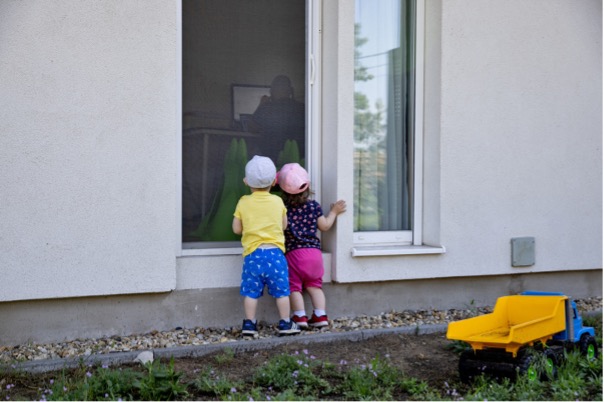
The six-week period after a temporary placement ruling allows both sides the chance to change their minds. The head of the agency told the couple they should only get in touch if there was a problem.
In practice they didn’t have time to count the days. After one week the boy was admitted to hospital. He wasn’t eating much and was crying at such a pitch that they knew something wasn’t right. The hospital’s first reaction was that “the gay dads are overreacting to a trapped fart. The baby has colic.” But the inflammation indicators were so high that the doctors suspected meningitis. They were allowed home after a week, but it was never clear what had caused the inflammation. The couple say that it never occurred to them to pull out of the adoption. That time in hospital just confirmed that they really were a family.
The critical six weeks ended in early January 2020, and the mother did not change her mind. “Those last few hours were very difficult. I sat looking at the clock, wishing the time to pass, wishing it to be midnight. At midnight we went into the children’s room and told them that they were staying with us. It felt so good,” says István.
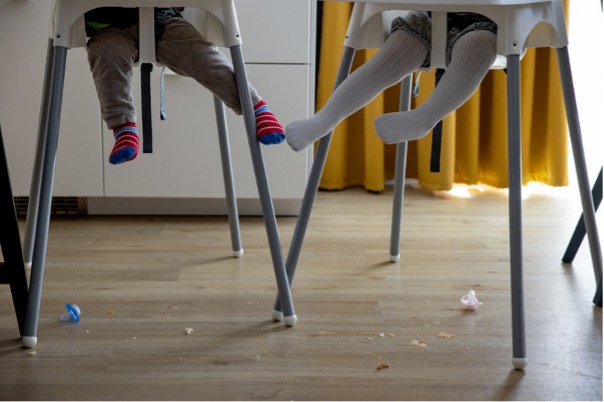
The dads wanted the children to have a definite female presence in their lives and to this end choose two godmothers who would be a part of their everyday lives. However, until they went to kindergarten the twins spent most of their time with István, while Tamás went to work. István spent more time with the twins, staying awake with them at night if they were ill, or reading up about weaning, and this awoke a sense of fatherhood earlier in him. For Tamás, the week-long stay in hospital with his son was an important turning point. Even though it did not bring a sense of fatherhood, it did awaken a sense of responsibility. “From then on it was totally clear that this child needed protection. We bonded that week, during those long nights,” says Tamás.
For both men, becoming a father has been a long process. “There comes the time when you are important, when only you can calm a child, when the child will only accept things from you. Those are the moments when you begin to feel that you are a parent, a father.”
The dads say that they have no traditional roles in the house. “We are equals, there is no division of roles. We each do the tasks we are better at or prefer doing. I am a much better cook, for example, but Tamás is better at cutting hair.” So István became Daddy while Tamás is Dad. It was one of the defining moments when the children identified them using those two words.
They have a lot less time for each other and their lives have changed: the focus is on the children, who they bring up with amazing humour but with consistency. It is such an idyllic environment that Orsi and I have noticed that we visit them to recharge our batteries.
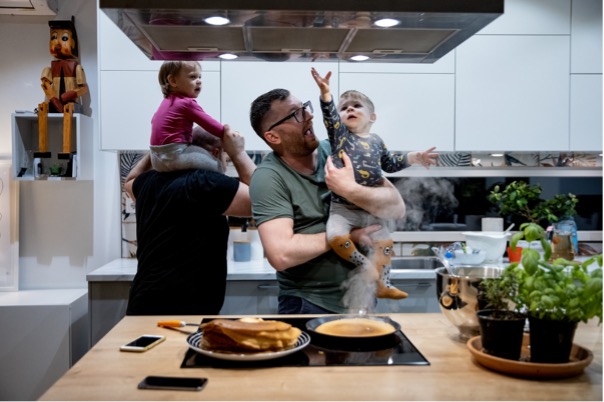
The two men have the kind of solid bond that it is rare to see in a relationship. They generally uphold traditional values in their parenting — they are pretty strict when it comes to eating, sleeping and watching television. Even so, there are times when we are run ragged, getting up at night or both kids screaming at once, even though of course it is the children who made the family complete.
“The first couple of weeks were very easy. They woke up every four hours, had some food and went back to sleep — and we wondered, is this it? Then suddenly they began crying and staying awake for longer and longer,” they recall. István and Tamás went through the same low points and doubts as any first-time parents.
“For eight years we had been trying to have children, we had done all we could, and then these two miracles arrived. But when you are up every night for three weeks you do ask yourself — and the fact that the question arises makes you feel bad — whether you are doing it right, whether this is what you want. And then you turn the corner. We were sitting there in the third week and I was rocking the little boy. I told him to give me a sign there is some point to all this, and he broke into a little smile,” says István.
Of course it hasn’t got much easier since then. The baby boy reacted much more strongly to stimuli, he was more sensitive and everything was more of a drama compared to his sister. He needed special exercises to develop his movement, but he has caught up completely. Now there is real competition as to who can dive more quickly onto the sofa, or who will pull the other round the kitchen island on the toy truck. So their lives are pretty much like that of any other family of twins. With one difference. Right from the start the dads have told the children that they are adopted.
“You instil an awareness of that— it’s not like that one day you sit them down and you tell them. You have to make the children aware that this is not a taboo subject, that this is something they can talk about.”
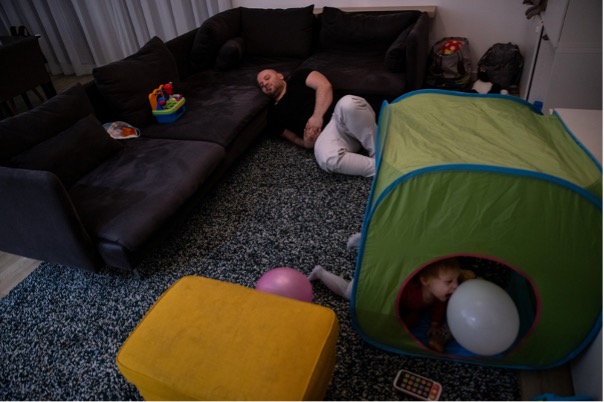
Zsófia Kiss says they recommend that parents find some form of positive expression for this. For example, “It’s so good we adopted you, as that makes the family complete.” What you might say will vary as the children get older. “By the time they go to nursery, they should be clear that they were from another woman’s tummy and were then adopted. As they develop, they will ask more questions about what happened and why they were adopted,” says the psychologist.
You won’t be able to get away without the child asking if their biological mother was a sex worker or was raped. “They could hear this from someone else, and the secrecy can drive a wedge between parent and child. You might need to call in a specialist at this point, since the story of their biological family is an integral part of their whole self-image. “You don’t have to embellish it, you just have to relate to the child’s biological roots acceptingly.”
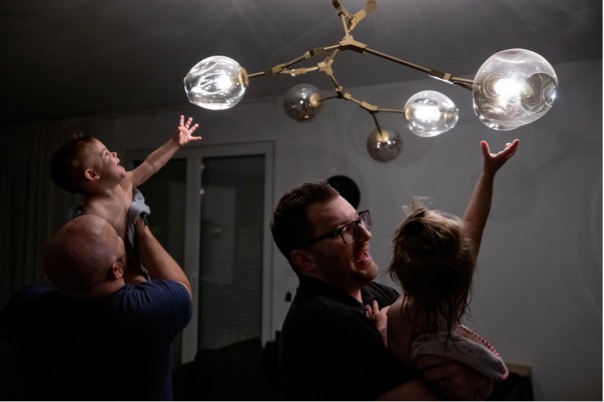
Also, it cannot be a taboo subject for the kids that István and Tamás are gay. “For them it will be natural that two people love each other, regardless of their gender,” says István. From the start the dads have smuggled in tolerance, acceptance and different family combinations into the twins’ lives. On the bookshelves, alongside traditional Hungarian children’s stories are books such as And Tango makes three, about two male penguins who create a family together.
István and Tamás say that ever since they were kids at nursery they were both more interested in boys than girls, but for many years they suppressed these feelings, mainly to live up to social expectations. Tamás says he did not want to stand out. He buried himself in his studies, tried to look “more manly” and to have dates with girls. István was having his own struggles. “I thought this was terrible, I so loved my mother and sister and felt they didn’t deserve such a bad family member.” He knew he had to keep it secret. He was constantly struggling with this and felt totally alone. He planned that he would have a wife and children but would lead a parallel life. As a teenager he did wonder if he should just end it all and then he wouldn’t hurt anyone.
However both of them came to the decision that they could not live like this. It helped that both of them could go to gay bars that had opened, where they discovered there were others like them. They also found more information on the internet. For István, the turning point was when a gay guy asked him: “You do know that you too have a right to happiness, don’t you?”

They say that it still isn’t easy talking about that period, not least because they don’t want to reopen old wounds. They know that it was just as hard for their parents to process the fact that their sons were attracted to men as it was for them. “We were smashing their dreams of a wedding and having grandchildren. It makes a parent blame themselves. Why didn’t I notice? What did I do wrong? Of course, the answer is nothing.”
István came out to his parents when he was 21. Tamás was 24 when he met István at a party in 2008. “It was love at first sight, the way we connected that evening,” he says. They started dating and then moved in together, but Tamás only introduced István to his mother and brother after they had been together for a year. He had never told them before that he preferred men. It took a while for the family to accept the situation and tell others.
István’s position is more complicated, as some of his family are less accepting. Until he was 30 he played along with this, and never spoke in front of his relatives about being attracted to men, though clearly everyone knew. It was just easier for one and all to keep quiet about it. For a while he brought Tamás to family lunches, but in the end it was just too awkward. He has completely lost touch with some of his relatives because of his relationship, but there are others who have become much closer since the arrival of the twins. The one person who they were most afraid would not be able to handle the children’s arrival was István’s grandmother. But she has been one of the most welcoming in the family, and was perhaps even more excited about them than the dads.
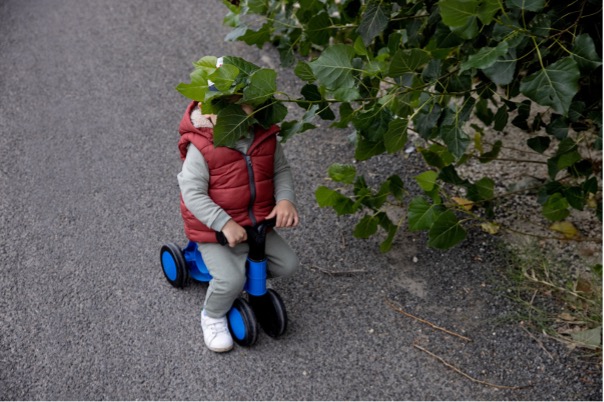
The couple do not usually get involved in political affairs, and they don’t like to mix family relations with politics, but the subject of the government’s policies come up increasingly often. They had never really paid attention to which party people voted for, and politics was never discussed at gatherings of family or friends. However, the anti-gay legislation has changed that. It particularly worries them as they are now a same-sex couple bringing up two children. “I’m concerned about the safety of my children. I didn’t care when it was just me being abused or spat at in the street, but now they might do it to my children,” says Tamás.
It would be painful now to find out that someone close to them has voted for the government. “That decision would effectively legitimate this whole madness — it would effectively be a vote against my family,” he says. They admit that if the government passes more legislation that makes their family’s life impossible, they might have little choice but to leave.
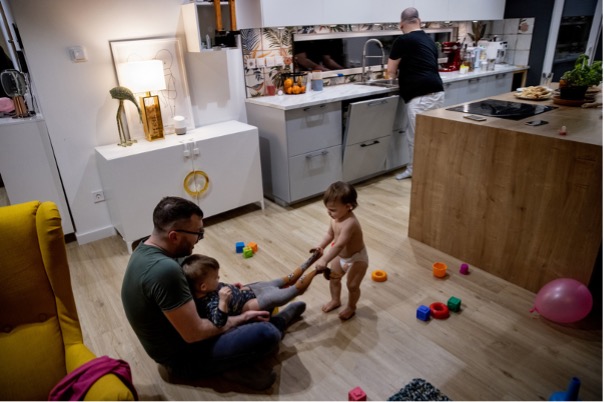
They feel that there is active incitement against gays in Hungary, although in their immediate environment they have not met much resistance. So far no one has created difficulties for them because they adopted as a same-sex couple. Their strategy is to take it as given that they are a rainbow family. They undertake the battles so that it does not make things harder for their children.
“We went into the kindergarten and told them that we are one family with two dads. We will do the same at the nursery and later at school.”
The health visitor “didn’t bat an eyelid” when Istvan told her the children did not have a mother, and in the kindergarten, where the children began at the end of October, the staff didn’t make any comments — on the contrary. The head didn’t cause a problem when it came to filling out the parts of the forms referring to the children’s mother.
The dads want to bring up the children so that they know how to defend themselves. “If they are self-confident and take it as natural that they have two dads — and what’s more feel good about being in this family — when anyone tries to make fun of them it won’t faze them.”
“We want to teach them to be tolerant, to understand that if someone hurts them, it’s not necessarily because that person is malicious — he or she might be just ill-informed. They need to learn to communicate with and educate those around them,” says Tamás.
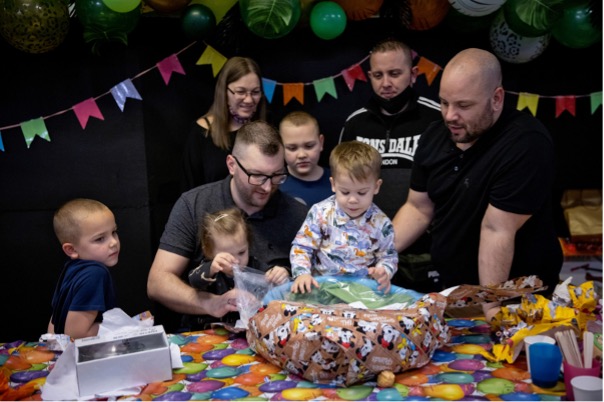
The dads were preparing for the twins’ second birthday for months, with a separate Facebook page, a present list, a three-tiered cake and enough balloons for a wedding. They wanted the perfect party as the pandemic prevented them from celebrating the children’s first birthday the way they wanted to. It all happened just the way they wanted, a big party with family, friends and lots of happy children. “As a parent it is very important — and it’s a very good feeling too — if lots of people like your children. And lots of people like ours.”
The alternative Balkan postal system
It’s still dark while I go down to Petrarkija Street, toward the Music Academy, disoriented and confused with the reality of the early Sarajevo morning. From the bell tower of the cathedral, right there around the corner, six o’clock rings out.
With the last toll of the church bell, the irritating sound of a Viber call pierces my sleepy mind. What is it now? I pick up the phone.
“Hey, where are you?”
She sounds angry.
I glance at my phone: 6:02. Damn cathedral. Is it possible God slept in this morning too?
“What’s the problem? I’m only two minutes late!” I say, getting angry myself. “We aren’t in Switzerland!”
At that moment I see her below — right at the corner of Štadler and Pehlivanuša, where we’d agreed, as she squats in front of her car. She spots me too. We both put our phones down. “Hajde, hurry up!”, she calls to me.
Rada doesn’t like when passengers are late. And not because she can’t be patient. When her job requires patience, she will wait, even for hours if she has to. But not today. Rada has a very tight schedule. At 6:05, just above Parkuša, we pick up a package. Dobrinja, 6:25, a young guy is waiting for us, he’s going to work in a hotel on the Albanian coast. Then at 6:30, in the Mojmilo neighborhood, across from the King Fahd Mosque — the biggest in Sarajevo, a gift from Saudi Arabia — we pick up a doctor. An upstanding woman, she often takes this ride. And then towards Pale, from where Ivana, a programmer, is heading to Belgrade for a work meeting and a family visit.
Rada knows that if I’m two, three or five minutes late, everyone else will need to wait at least that long, or perhaps longer, if we get caught at a traffic light. And Rada hates for her passengers to wait. Those awaiting her passengers and those who aren’t awaiting passengers but rather the packages Rada carries with her, which are usually not any less important, also hate to wait. Above all, Rada wants us to reach the Drina River and cross the border before traffic gets bad, which starts around 8:30. If we fail, all these people will wait a lot longer.
“You get it now, what the problem is?” she asks brusquely, after giving me an in-depth rundown of the situation as we blast down the empty Tito Street toward Marin Dvor at the speed of light.
I’m a bit ashamed.
“But what are you gonna do? We’ll get there,” she says. “How are you? What’s new with you? How’s your mother?”
***
Since she started taking passengers between Sarajevo and Belgrade 20 years ago, Rada has been performing an additional, but no less important, transport function, working as part of an informal postal network. She transports anything anyone wants to send, as long as it’s legal and can fit in a car. In most cases it can.
“One time a woman came up to me in Belgrade, she’d bought everything you can imagine, just walked into shops and started filling her bags. Gimme this, gimme that. She brings two huge sacks and asks, will there be enough room in the trunk? I take a look and on top of one of the sacks sits a giant bag of popcorn. Well, alright ma’am, I think to myself, do you really need to send the popcorn too? There’s popcorn in Sarajevo! But what can you do, she is sending it to her mother. We’ll find the room!”
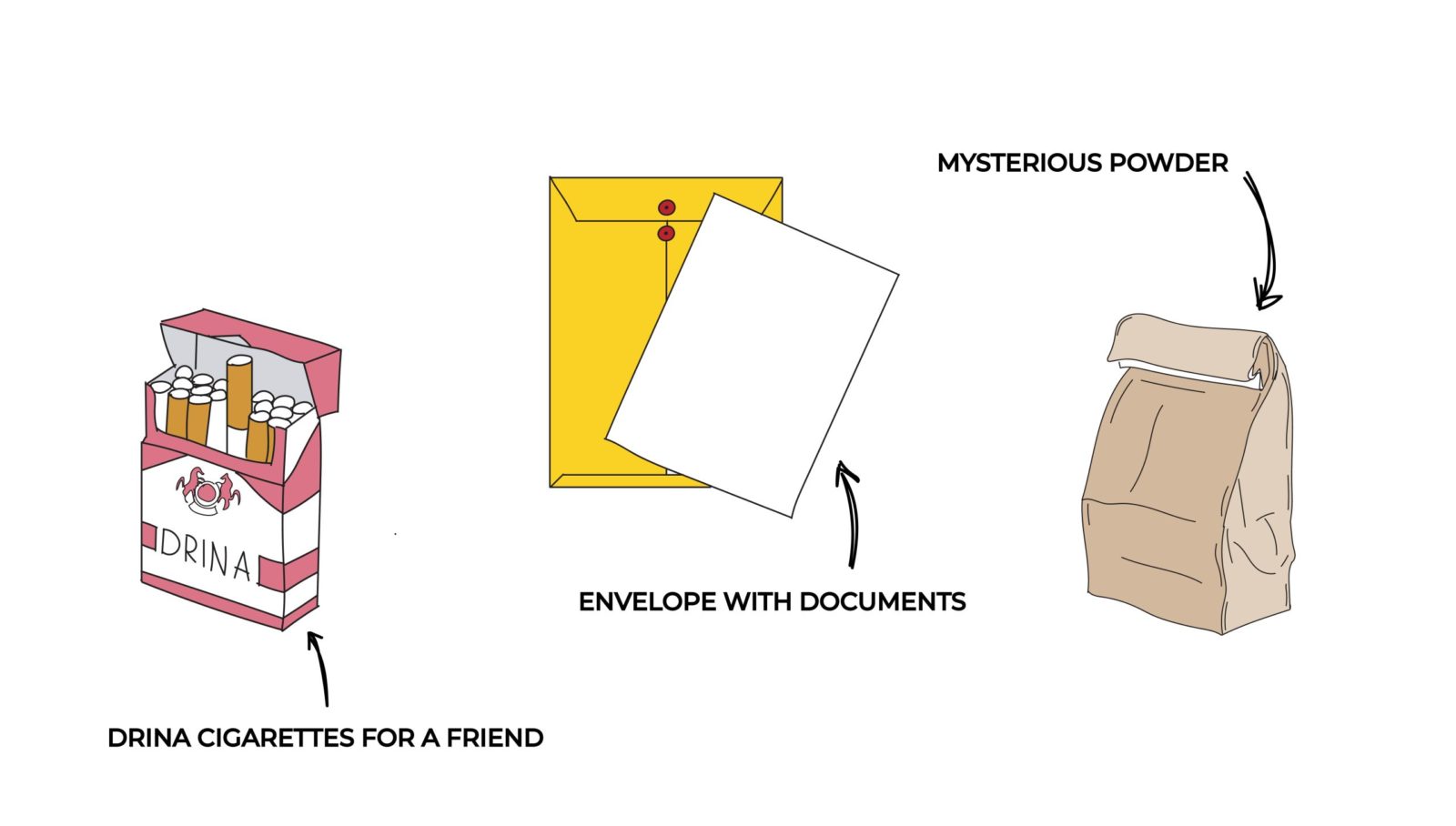
This time around, it’s not just Rada on the job. My bag is also full of packages. I’m bringing a carton of Sarajevo’s Drina-brand cigarettes for a friend and the night before I was given an envelope with documents — what they are or who they’re for I don’t know, but it’s important that they arrive in Belgrade as soon as possible — as well as a pouch full of some strange powder with big chunks and a coarse texture. The man who handed me the pouch said the name of the substance but I didn’t understand what he was saying. Then he repeated it. I still didn’t understand but I decided to pretend I had. Now I’m wondering if it’s legal. I hope it is. He looked like a fine guy. The person who put us into contact to hand the package off also seemed fine. At any rate, better not to mention this to Rada. If there is room for the popcorn, there must be room for my weird powder.
***
A leap of 300 kilometers in distance and a few months in time, into a bustling spring afternoon at the Belgrade bus station.
With broad strides I head toward the hall of ticket counters. My steps grow tighter; the narrow hallway between the counters and the departure platforms is packed with passengers, suitcases, shouts, rushing, confused looks, hugs and kisses.
Amid the commotion, my eyes are drawn to an old analog station clock. The long white hands show a calming sight: it’s 15:49. I love it when I arrive early, even if it’s just one minute.
At that moment, my phone rings. “Where are you?” He doesn’t sound angry but it does sound like he arrived before me, and on time. I start saying that I was the one who came early, but then I glance at my phone. It’s 15:52. Oh God.
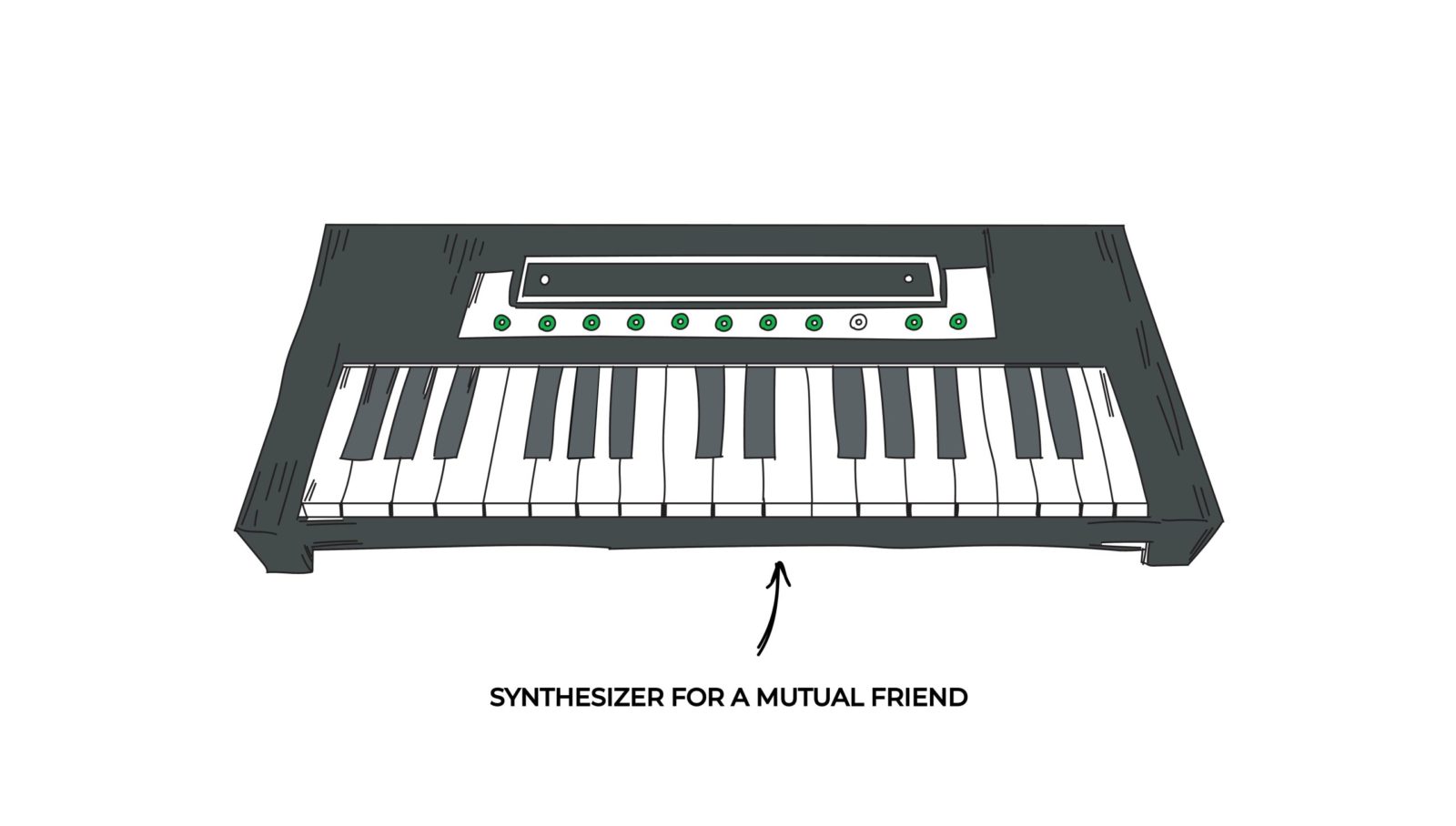
We meet at the entrance to the platform. We don’t know each other but recognize each other easily. He is holding a large box with a synthesizer inside, a package I need to deliver to a mutual friend.
I take the box. “Okay, that’s that,” and we part ways. I’m a mailman on an important mission and I don’t have the time to waste on courtesies. I run to a counter and buy a ticket.
Outside, at platform number four, the bus for Prishtina is filling up.
***
I started my “job” as a mailman in autumn 2020, when I first began traveling between Belgrade and Prishtina so often that people started noticing, and for people to notice it’s enough that you’re traveling more often than, well, never.
And so one day I got a call from a friend I hadn’t spoken with for a while but who somehow knew about my recent travels. A family from Prishtina was on vacation in Belgrade and their daughter had left her doll behind when they returned home. While the weather map on Radio Television Serbia shows Prishtina as part of Serbia, as far as the Serbian postal service is concerned, this city doesn’t exist, just like other places in Kosovo where Serbs aren’t the majority. Private delivery services are way too expensive. The only way the doll could reach Prishtina was for somebody to take it with them.
Would you mind doing that? It’s not urgent. But, actually it is. It’s her favorite doll.
The next time, a request came from the other side: Hey, do they still have that Skenderbeg drink? Please pack two for me, I really miss it! Then, in Prishtina: It’s not easy to find film for analog cameras, and there’s that one shop in Belgrade where it’s not expensive. Can you bring me some? A few months later, on the list of my successfully completed tasks were vinyl records of Belgrade’s New Wave, a kilogram of dried sausage, the keys to someone’s apartment, and the books by Petrit Imami about the common history of Serbs and Albanians (happily, but ironically, they had immediately sold out in Belgrade).
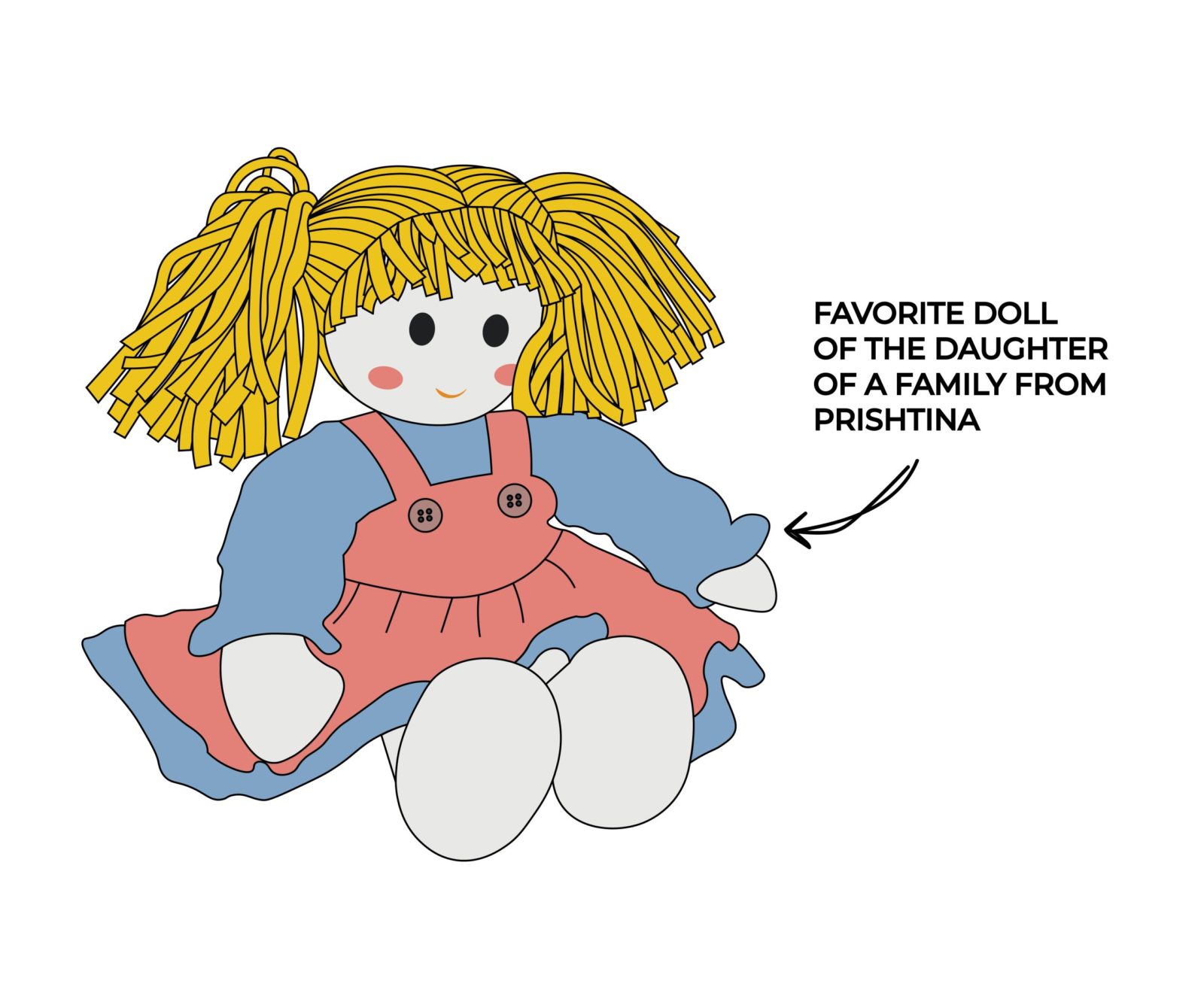
And that’s when I started noticing that almost all the personal exchange that exists between Kosovo and Serbia — between close family members, cousins and friends, between those who left, those who fled, those who stayed and those who were caught somewhere in-between — all this exchange depends on three buses that run day and night between Belgrade, Prishtina and Prizren, and on the small group of people who travel on these buses.
***
While the drivers in neat white shirts are hurriedly loading luggage, my attention is drawn to an old lady in black who is standing next to a giant plaid bag. It’s not clear to me how she got it here. She’s patiently waiting in line. She smiles at me. I think she likes me. We start talking.
“Where to in Kosovo?”
“I’m not traveling, son. I’m sending things to my family.”
I start to ask her what she’s sending them, but one glance at the enormous Chinese-made bag answers my question. It’s full of homemade food packed carefully into plastic ice cream boxes and large glass jars. Is that sarma? I also see an old plastic box of a brand of cheese from Sombor, wrapped in thick rubber bands so that whatever mystery it holds, perhaps a salad, doesn’t spill out during travel.
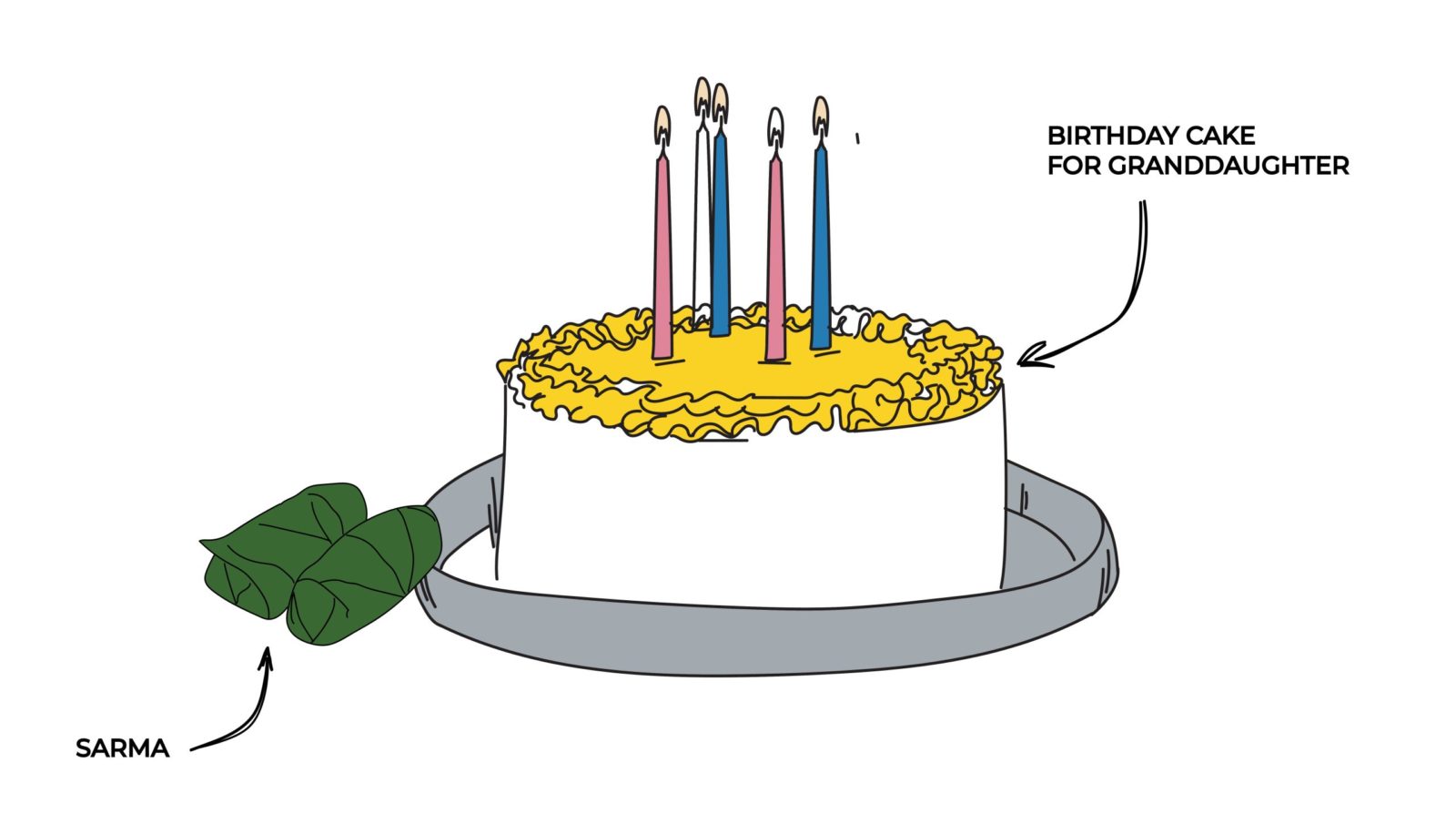
Her sister lives with her family in Gračanica, near Prishtina. She hasn’t stayed with them since corona broke out. She hopes to visit soon, perhaps next month, when she is done with some medical check-ups.
“Are you often sending things?”
“Not that often. They have food there, it’s not that they don’t. But they love it when I cook for them. Recently, my granddaughter celebrated her birthday. So, there is cake! It’s convenient this way, I just put it on the bus. Otherwise, it would be impossible.”
I stop and think how it would look at the counter in the post office to send homemade food. The serious face of the clerk looks you over through the glass. What’s in the box? A strawberry cake and sarma with dried ribs! How fast do you want it delivered? Immediately, so that it doesn’t go bad, you see how hot it’s been these days! Declared value? Priceless!
***
As I will find out through several trips and dozens of conversations with people who send and receive things across the Balkans, it’s not all just an issue of food and its perishability.
Uncle Pera is returning to Lipjan; that’s where his home has been for over 60 years. He had been on a visit to Belgrade. We are sitting together on a bus. Somewhere around the toll ramp at Bubanj Potok, I offered him some Plazma cookies. In return, when we stopped for a pause at a gas station somewhere around Pojate, he gave me a cigarette. I ask him whether he sends or receives anything from Serbia by mail. He decidedly says “no.”
“You never know with them! Two months ago, my son was looking for some car documents from a friend in Kraljevo. They still haven’t arrived.”
Uncle Pera clearly doesn’t trust institutions. And judging by the number of things that travel by bus everyday, he isn’t alone.
Sitting with the drivers in the semi-dark of a roadside cafe with the longing name of “Evropa,” I’m trying to figure out what everyone is sending. Most of the travelers sit outside waiting for the sign for departure.
“Are you trying to see if we’re carrying any drugs?” one guy asks me gruffly, as he offers me a piece of chicken he just pulled out of some aluminum foil.
He offered me chicken out of common courtesy. He asked the question out of open distrust. A journalist who writes about people who are sending stuff by bus? Why would anyone do something like that? And what does that exactly mean — are they sending some interesting things? What could be interesting there?
“Don’t worry, I’m not a police officer,” I tell him. I take out my journalist’s credentials. Afrim wipes his fingers and takes a look with genuine curiosity. A thought comes to me that people in this cafe have probably taken many things out of their pockets, but it is certain that this was the first time that somebody had taken out a card from the International Federation of Journalists. It seems to have some effect on him.
“What are people sending? Well, everything. Documents mostly,” Afrim says. “Paperwork for pensions up there, in Belgrade, for those who worked in firms before the war, for real estate, if somebody is selling something in Kosovo. Medicine. People also send money. Mobile phones, clothes. All types of stuff.”
“Do you sometimes experience any trouble?” I ask. Afrim gives me a sharp look. He again thinks that I’m a cop.
His colleague Edin enters the conversation: “It happens sometimes that people don’t show up to pick up their things. Or they ask us to wait for them someplace else… How the hell am I supposed to wait?”
“What happens with those things?”
“We return them to the agency and the sender goes to pick it up there.”
“Does it sometimes happen that no one picks it up?” I ask, imagining a magical antique shop, with various objects scattered around because people forgot about them over the years, each with its own history, ordinary and unusual story… Now, that would be something!
Afrim rudely interrupts my fantasy. “No, never. They always come. Come on, let’s go.”
***
Sending packages by bus or taxi, by driver, friend or acquaintance, is one of the most functional social inventions in the Balkans. It’s as fast as the speed of a car or bus. And in a place where railway and airline connections have been destroyed or simply canceled, it’s the fastest way to send or receive things.
One specific person — driver, friend or acquaintance — takes care of the delivery. It is a person you either know or at least met, someone you’ve shaken hands with at some point and exchanged a few words. It seems in those 30 or 60 seconds a level of trust is built that is so much greater than it’s possible to establish with any postal service worker, hidden behind the counter with their promotional stock photos of yellow vans that always arrive on time.
Who would you trust more, a company with a slogan that guarantees your shipment will be delivered in the next 48 hours, and which offers you the possibility to follow your shipment through a special code, or a driver who, when asked “when will it arrive, approximately?” — asked bashfully so as not to appear as if you are, God forbid, rushing him because he has every right to get there whenever he wishes — first looks into the distance, inhales a smoke, and exhales: “it depends on the rush hour, but not before nine”? And they always give you a time that’s too early. Better for you to wait, than for the whole bus.
Somehow, for an astonishingly high number of people in the Balkans, the right answer is B.
***
Finally, there is the issue of pricing.
When you send by mail, there are a number of relevant criteria. The weight of the object, its value and the distance and speed of the delivery. Postal websites and applications are filled with detailed tables and calculations enabling you to estimate the price down to the cent. With a calculator or without one, it’s often quite high. For example, to send a half-kilogram package from Serbia to Bosnia, without a return receipt, separate handling or air transportation, it will cost you around 18 euros. If you want to send that package to Kosovo via DHL, the price is around 50 euros.
But when you send it informally, that’s when you enter the field of a magical Balkan ritual, bounded by clear rules within which absolutely nothing is clear. When a friend or acquaintance takes a package, offering money for the service is like cursing their mother. An unwritten rule calls for inviting the helper to a glass of juice or coffee, but discreetly, to make it look like you aren’t inviting them only because they helped you out, but because you really want to get a drink with them.
At the same time, it is almost expected that they will reject the refreshment because neither of you has time nor desire for drinks. If the two of you wanted a drink, you would drink, without any packages. Though without that drink, you become indebted to the helper. Rest assured, if you ever do anything to displease this person, they will go around and say how they foolishly helped you when you needed it and this is how you repay them!

When it comes to bus drivers, things are a bit different. Every day, sometimes twice a day, they carry packages across borders, taking a risk (although, they often check what is inside; if it appears illegal, dangerous, or that it could break easily, they will refuse no matter how much money they are offered). They carefully keep track of what they are carrying and for whom and where people will await them. They write down names and phone numbers, call senders from dimly lit stops by the side of highways, arguing with people who are late or have simply forgotten to show up to pick up their packages.
To put it shortly, they expect you to pay them, and for good reason. But transporting things by bus isn’t quite standard, nor do the bus companies officially permit it, so there usually isn’t any official price list. It depends on what you’re sending and sometimes on the mood of the driver, but some charge the equivalent of a full bus ticket, others a half. Others allow you to independently set the price for the service.
And so we arrive at the precious social rule known as “However much you can give” (“Kol’ko daš”). As with everything else in this region, the rule isn’t what it claims to be. On the surface, you are free to independently assess the value of the service. However, what you are actually assessing is the assessment of the other side of the transaction, that is, how much money will it take so the other person is not offended. That’s why more often than not you pay more than the service is really worth.
All the same, it’s still cheaper than the postal service, and incomparably more fun.
***
We’re on a tight schedule but Rada allows for a quick break at the gas station because someone needs to go to the toilet. I use the opportunity to grab a cigarette, or rather, that’s what I wanted to do when I realized that I have none left. Luckily, I have a carton of Drina cigarettes that I brought to deliver to my Belgrade friend Bojan. He won’t mind.
The terms Drina and Sarajevo play a significant role in his life, and not just because of cigarettes. Bojan belongs to a small group of journalists in Serbia who have been bravely and consistently writing about Serbian war crimes in Bosnia of the 1990s. Every week, links to articles arrive in my inbox that, I fear, almost no one reads.
But Bojan isn’t giving up. He is currently working on a documentary about The Belgrade Circle, a not-so-small group of liberal intellectuals and peace activists that stood up against Milošević’s regime, wars and crimes in the early 1990s. Thirty years later not even a distant echo of their voices remains in Serbia’s political scene. It’s now just a memory in the heads of a small circle of devotees.
While we drive through Romanija, I feel like we are traveling through one of his stories. We pass through the beautiful nature of eastern Bosnia and see road signs with some of the most horrible toponyms from the war, places that many in Serbia have only heard about from Hague testimonies, as symbols of massacres, rapes, and ethnic cleansing. Here, just before Sokolac, that’s where we find the turn to Rogatica. You travel upward to reach Han Pijesak, then you go to Vlasenica, then Milići and Zvornik, and if you were to travel south from Zvornik, you’d reach Srebrenica.
Rada, a Serb refugee from Sarajevo, who fled the city at the start of the war, now lives in Pale, with a distinctly clear attitude about this topic: “We were lucky. Neither my family nor I were hurt by anyone, nor have we inflicted harm upon anyone.” If it were any different, I suspect that it would be impossible to do her job: “I went to Sarajevo immediately after the war. I have nothing to hide.”
Finally we reach the Drina River.
“I used to smoke Yorks from Rovinj,” Bojan tells me, “until all ties were severed with Croatia in 1991, so I switched to Drinas.”
Bad call, Bojan, because the ties with Bosnia didn’t last long either. He started smoking them again in the early 2000s in Sarajevo. Bojan loves Sarajevo; sometimes he just disappears there and comes back more alive than ever.

And why the heck am I bringing him Drinas, aren’t there any in Belgrade? Somehow, in March 2022 the 140-year-old Sarajevo Tobacco Factory, located in a country where almost a third of the adult population are passionate smokers, shut down. Old Drinas are still in stock though, and Bojan wants to smoke them as long as they last.
I wonder if we could claim the same thing for The Belgrade Circle. The anti-war idea in Serbia has broken down, and we have been smoking stocked goods for years. But they’re dwindling.
***
Gone are the days when the Merdare border crossing was a place where you expected problems, either as a Serb at the Kosovo checkpoint or an Albanian at the Serbian checkpoint. Nevertheless, as we approach from Kuršumlija, the bus somehow always settles down and the atmosphere becomes darker and tenser. There’s a feeling of sinister anticipation. Perhaps the scenes of desolation all around us contribute to that. Empty fields, empty streets, empty houses. And a completely empty road, which seems to lead to the end of the world.
Here and there, on signs along the road you see Albanian toponyms: Kastrat, Ljuša. The village Arbanaška is also nearby. But there have been no Albanians here for a long time. On a hill near Degrmen, two kilometers from Merdare, arise the dark ruins of Beć’s church, which was built starting in 1912 with money from Serb immigrants arriving from the Sandžak, Montenegro and Zubin Potok, who came for the lands of Albanians and Turks who fled to Kosovo after the 1876 Serbian-Ottoman War. Due to the poverty after World War I, work on the church was postponed for better times, which never came. There are not many Serbs left here either; the crumbling road to mythical Kosovo takes you through one of the poorest municipalities in Serbia.
The call echoes through the bus in Serbian and Albanian: “Prepare your IDs!” In honor of the mutual non-recognition of Serbia and Kosovo, for Kosovar and Serbian citizens, passports are invalid here. First, the Serbian policeman enters. In dead silence, he collects our IDs and carefully sorts them in his palm, and then goes out. After the check, the driver brings us our IDs back, but we get to keep them only for a minute, as it is now the Kosovar policeman that enters. The entire procedure is repeated.
All of a sudden, there’s a problem. The customs officer is lingering around the back trunk. He argues with the driver and shows him something. Passengers on the right side of the bus stare at him intently, and the left-side passengers stare intently at those on the right side because they can’t see the customs officer. What did he find? Will they let us through? Deeply buried fears rise to the surface. Suddenly, we know that anything is possible.
The driver shakes his head. The customs officer also shakes his head. It’s as if he doesn’t want to have to deal with this stuff. He slams the trunk door closed. I had the feeling that we all could breathe again.
We enter Kosovo. Now we begin seeing signs with Serbian toponyms, but no Serbs.
***
Belgrade, late May.
Lula greets me in the inner courtyard of an old villa in the center of the city. The street is packed with a hellish noon crowd. In the yard, full of delicate red and yellow flowers, there is complete silence.
Lula is just like that villa in many ways: elegant, sad and turned inwards. “I haven’t been out at all in a long time,” she tells me. “This is no longer my city.”
The letter and the bag were delivered to her neatly and on time. I decide not to inquire about the contents of theenvelope. I assume there was a reason that it was sealed. But I can’t bear to not ask about the bag of mysterious powder.
“Tarhana,” Lula smiles. “A soup mixture. My aunt Ešrefa from Travnik prepares this for me, and sends it through my nephew. They prepare it differently in Serbia. It’s good too, but I like hers. In Serbia, they usually say ‘tarana,’ as they don’t like that ‘h’ here because it was adopted from Turkish. Just like in Bosnia they started to insert it in places where it doesn’t belong.”
Lula has plenty to say about the packages that are sent between Belgrade and Sarajevo. Born in Sarajevo, she has been living in Belgrade since the end of the 1960s. She’s a person who, immediately after the beginning of the Sarajevo siege, collected and shipped humanitarian aid to the besieged city. She struggled for every shipment to reach who it was intended for. And she fought for thousands of them, shipments and people. “When I see cardboard boxes today, I feel nauseous.”
I leave her on the terrace of the old villa, carefully observing the flowers, while she slowly chews over the memory of a time when some resistance existed.
***
We are sitting in the restaurant Kraljevo, not far away from a big parking lot on Sarajevska Street in Belgrade, where Rada traditionally picks up and drops off passengers. Where else?
She spent the whole day in the car and is very tired but she finds the time to talk. She tells me how she has been fainting lately. The other day, she barely got in the car, but she didn’t give up. She transported her passengers and packages. She is receiving regular therapy now, and things will get better.
It’s a hot day. We order a light lunch, soups and cabbage salad. The tavern is empty and the waiter is bored, so he makes inappropriate jokes. Rada charmingly ignores them.
“Anyway, I have a story for you,” she tells me:
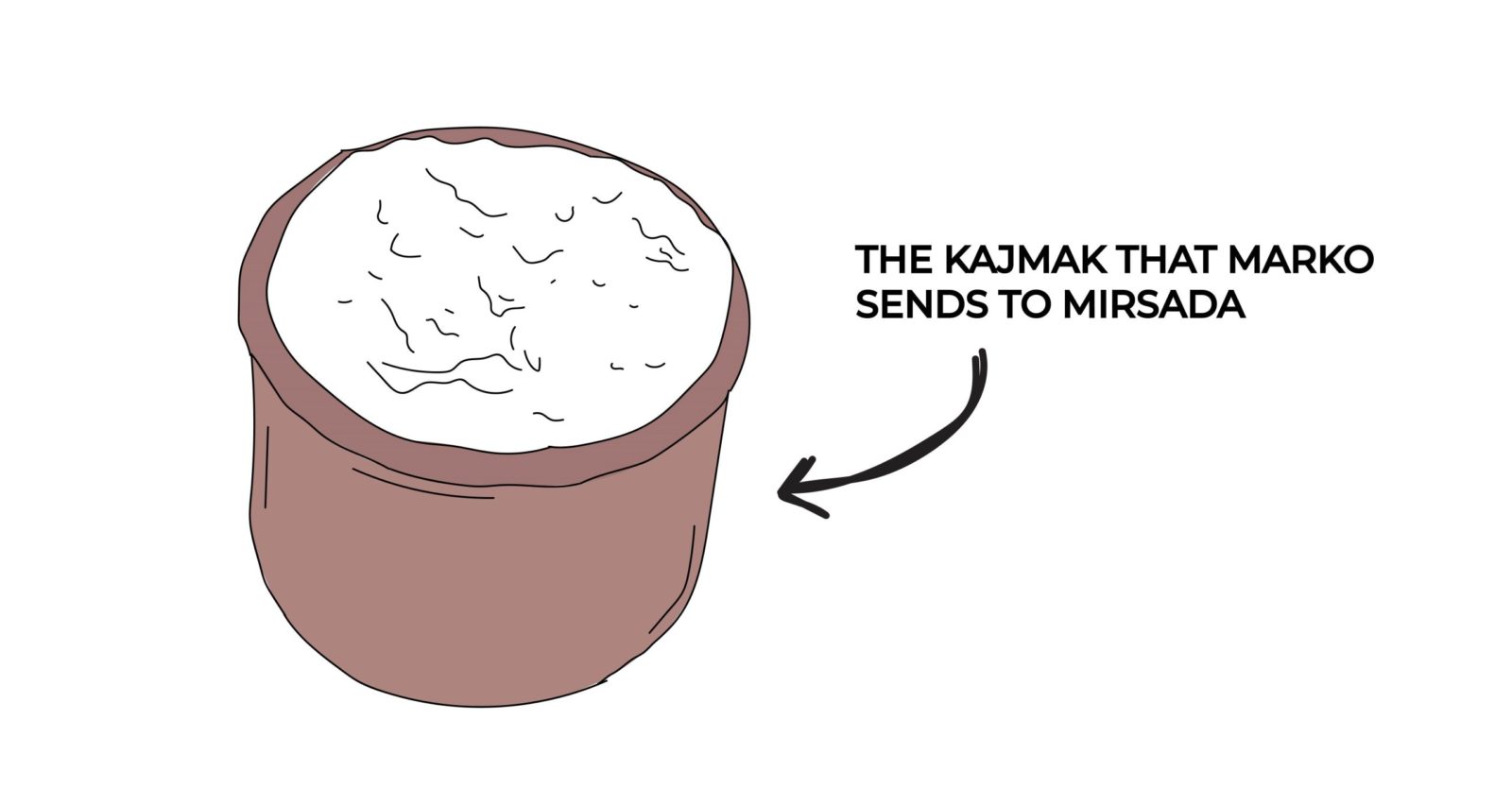
“In Sarajevo, there is this woman, Mirsada. She had a husband and a son. And the son had a friend, Marko, who didn’t have parents. She liked him a lot. So, anyway, Marko… Until then no one cared about what names people had. Normal people didn’t care about names. But that’s when the war started. She wondered what to do with him. Mirsada hid Marko in her house, so he wouldn’t get killed. She told me, ‘Rada, I kept him in the freezer. My child went off to the battlefield, and Marko was in the freezer.’
“She hid him until she found a person, somebody she could trust, so that she could get him into the territory of Republika Srpska, and then to Belgrade.
“And so, time goes by, and Marko becomes a very successful man. He starts a family, starts a business and everything goes flawlessly for him. And Mirsada, her husband dies, she stays with her son. And I don’t know the details, but somehow they got in touch with Marko. Imagine, after all these years…”
“And then,” Rada pauses, “then her son dies too. And Mirsada is left alone, and Marko becomes the only light in her life.
“Since then, since I’ve been working, he keeps sending her stuff. A bag of beans, peppers, walnuts, kajmak, a jar of honey. And he makes sure to send some money, 50 or 100 euros, but always with some food.
“So, I asked him once — Marko, my boy, you buy this food, and she has to go out and collect it and carry it back up to her apartment — wouldn’t it be easier for you to send her the money so she can buy it herself?
“He tells me, ‘Rada, I tried doing that but she is happy when she gets that box of kajmak and she can say — look at what my dear Marko sent me!”
And that’s when I finally got it. It’s not things that travel, it’s people. And only when people can’t, do they send things. But even then, in actuality, it’s not things that travel — but people’s feelings.
Editor’s Note: By request of the interviewees, some of the names in the text have been changed.

